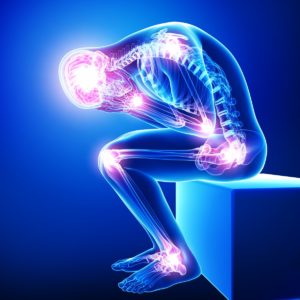Practical Steps for Reversing Fibromyalgia
Fibromyalgia seems to be affecting more and more people, but what is it, and are you getting correctly diagnosed? On a high level, common symptoms include pain, achiness, fatigue, mood imbalances, and gut issues. Diagnosing fibromyalgia is difficult, so it’s important to work with a doctor you trust who will rule out other causes first.
If you need help with fibromyalgia symptoms, click here
Practical Steps for Reversing Fibromyalgia
Fibromyalgia seems to be affecting more and more people, but what is it, and are you getting correctly diagnosed? Fibromyalgia is actually a diagnosis of exclusion, similar to IBS. You can’t make the diagnosis until you’ve ruled out other causes. On a high level, common symptoms include pain, achiness, fatigue, mood imbalances, and gut issues.
While there are diagnostic criteria for fibromyalgia, it’s prone to overdiagnosis. This means that sometimes patients may be diagnosed with fibromyalgia when they actually have another condition. There are other conditions with symptoms similar to fibromyalgia, such as hypothyroid or myofascial pain syndrome.
Many doctors explain fibromyalgia as a muscle issue when, in fact, it’s not an issue with the muscles at all. True fibromyalgia has nothing to do with the muscles or soft tissues. Although a person may experience pain in different parts of the body, the issue is in the brain and central nervous system.
Fibromyalgia patients are hypersensitive to pain, and they perceive pain in the body when there’s nothing physically wrong with the muscles or tissues.
Diagnosing fibromyalgia is difficult, so it’s important to work with a doctor you trust who will rule out other causes first.
Common symptoms of fibromyalgia:
- Global pain: pain and achiness that is all over the body, not just a couple regions of the body
- Pain exists in soft tissues, not joints
- It doesn’t come and go — it’s persistent
- Persistent, ongoing fatigue
- Difficulty falling asleep, racing mind
- Not feeling rested after sleep
- IBS symptoms — distention, gas, bloating, constipation
- Mood disorders — anxiety, depression
- More prevalent in women than men
Treatments:
- Diet — whole foods, anti-inflammatory
- Supplements — nutraceuticals that modulate neurotransmitters such as 5-HTP or tryptophan
- Psychological therapy — cognitive behavioral therapy, mindfulness meditation, prayer, yoga, tai chi, chi gong, EEG, heart rate variability
- Circadian rhythm therapy
- Sleep hygiene
There are no drugs on the market specifically developed to treat fibromyalgia. The drugs available are all repurposed. The most common are antidepressants and antiepileptic medications. Unfortunately, there are no good solutions in pharmacology.
Proper diagnosis is half the cure. You must know what is causing the problem. Once you have a definitive diagnosis of fibromyalgia, you’re more likely to have a successful treatment.
Some places to start even before you have a diagnosis:
- Implement whole foods, anti-inflammatory diet — remove inflammatory foods like gluten, dairy, sugar
- Incorporate more motion and mobility into your life
- Daily stress management therapy — deep breathing, yoga, tai chi
Fibromyalgia patients are hypersensitive to pain and generally have low central nervous system serotonin levels. If the patient is low in global serotonin, they won’t sleep well and they won’t wake up feeling rested and refreshed. They’ll tend to have depression and anxiety. If the patient’s gut serotonin levels are low, they’ll have constipation.
Most patients will benefit from treatments that boost serotonin levels, such as the serotonin precursors 5-HTP or tryptophan. Some patients do well with SSRIs, but these should be used with caution.
It’s also helpful to use agents that calm this hyperactive nervous system, such as calming neurotransmitters like GABA or calming nutraceuticals like L-theanine and inositol, and magnesium. Calming adaptogenic herbs like ashwagandha and botanicals like valerian, passionflower, and chamomile are helpful as well.
While addressing the biochemical component is critical, you must also implement the daily calming practices as mentioned above that include deep breathing, meditation, prayer, yoga, etc.
If you want to learn more about fibromyalgia diagnosis and treatment, listen to our podcast with David Brady here.
If you need help with fibromyalgia symptoms, click here

Discussion
I care about answering your questions and sharing my knowledge with you. Leave a comment or connect with me on social media asking any health question you may have and I just might incorporate it into our next listener questions podcast episode just for you!